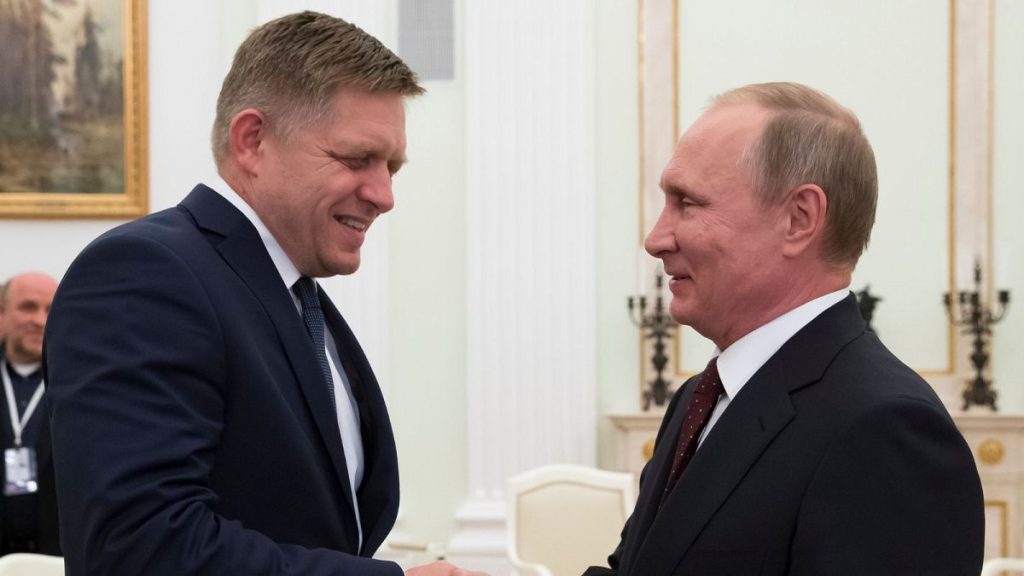Robert Fico, the Prime Minister of Slovakia, embarked on a working visit to Moscow, marking a rare encounter between a European Union leader and Russian President Vladimir Putin since the onset of the full-scale invasion of Ukraine in February 2022. This visit, following a similar one by Hungarian Prime Minister Viktor Orbán earlier in the year, underscored the complex energy dynamics and political tensions characterizing the relationship between certain EU member states and Russia amidst the ongoing conflict. Fico’s meeting with Putin, conducted on a one-on-one basis, focused on undisclosed matters, but it occurred against the backdrop of a sharp escalation in tensions between Fico and Ukrainian President Volodymyr Zelenskyy.
The core of the dispute between Fico and Zelenskyy revolves around the transit of Russian gas through Ukrainian territory. Zelenskyy’s decision to terminate this transit arrangement after 2024 has sparked significant concern in Slovakia, a landlocked nation heavily reliant on Russian gas supplied by Gazprom via pipelines traversing Ukraine. Fico has publicly criticized Zelenskyy, accusing him of jeopardizing Slovakia’s energy security and potentially destabilizing gas prices across Europe. He further contended that Zelenskyy’s actions would inflict substantial economic harm on the European Union.
Fico’s visit to Moscow and his vocal criticism of Zelenskyy highlight the delicate balance Slovakia faces in navigating its energy dependence on Russia while maintaining solidarity with the EU and Ukraine. His remarks at a press conference following an EU summit in Brussels underscored his unwavering stance on this issue, and he further asserted Slovakia’s opposition to Ukraine’s potential NATO membership. This position aligns him with the stance taken by Hungary’s Prime Minister Orbán, known for his relatively close relationship with Putin.
The visit itself drew immediate attention and scrutiny, given the limited direct engagement between EU leaders and Putin since the outbreak of the war in Ukraine. Orbán’s earlier visit to Moscow had already faced widespread condemnation from both Kyiv and other European leaders, highlighting the sensitivity surrounding such interactions. Orbán’s position within the EU is often perceived as being uniquely sympathetic to Putin, and he has consistently employed tactics to obstruct, delay, or dilute EU initiatives aimed at supporting Ukraine and imposing sanctions against Russia.
Fico’s meeting with Putin underscores the multifaceted and often conflicting priorities facing EU member states in the context of the Ukraine war. Slovakia’s dependence on Russian gas creates a vulnerability that Russia can leverage, potentially straining relations within the EU and complicating efforts to maintain a united front against Russia’s aggression. Fico’s pointed criticism of Zelenskyy further exacerbates tensions between Slovakia and Ukraine, adding another layer of complexity to the already fraught geopolitical landscape.
The ongoing war in Ukraine has exposed the intricacies and vulnerabilities of Europe’s energy landscape. Countries like Slovakia, heavily reliant on Russian gas, find themselves in a precarious position, needing to balance their energy security with the broader political and security concerns posed by Russia’s actions. Fico’s visit to Moscow and his public pronouncements reflect these complexities and underscore the challenges facing the EU in maintaining a cohesive response to the Ukraine crisis. The visit also highlights the potential for Russia to exploit these divisions within the EU, further complicating efforts to resolve the conflict and ensure long-term stability in the region.

